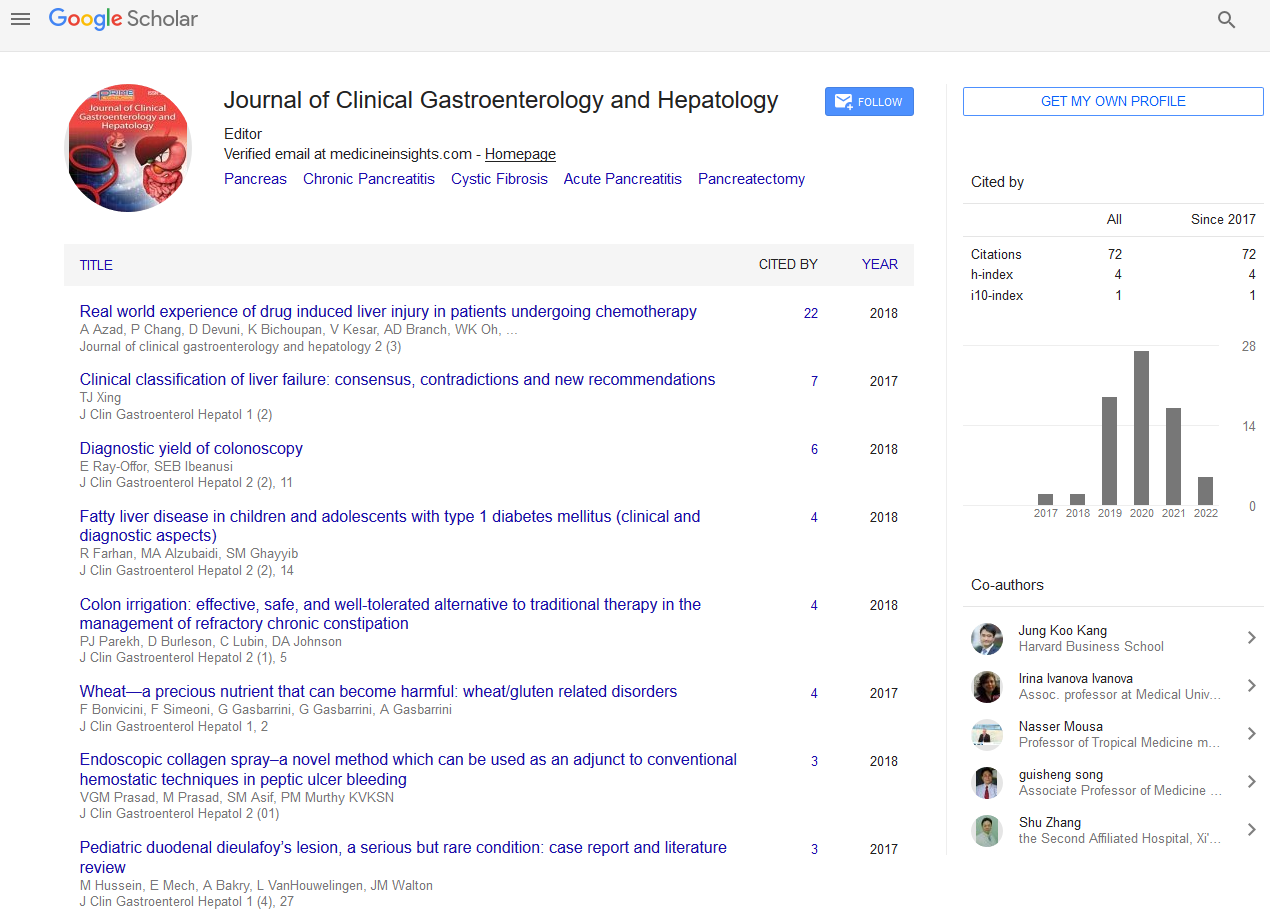Perspective - (2022) Volume 6, Issue 12
The Main Reason for the Indigestion and its Major Causes
Paul Williams*
Department of Gastroenterology, University of Fort Hare Alice Campus, South Africa
*Correspondence:
Paul Williams,
Department of Gastroenterology, University of Fort Hare Alice Campus,
South Africa,
Email:
Received: 30-Nov-2022, Manuscript No. IPJCGH-23-15588;
Editor assigned: 02-Dec-2022, Pre QC No. IPJCGH-23-15588 (PQ);
Reviewed: 16-Dec-2022, QC No. IPJCGH-23-15588;
Revised: 21-Dec-2022, Manuscript No. IPJCGH-23-15588 (R);
Published:
28-Dec-2022, DOI: 10.36648/2575-7733.6.12.59
Introduction
An upset stomach, dyspepsia, or indigestion is terms used to
describe upper abdominal discomfort. Abdominal pain and a
feeling of fullness immediately after eating are two signs of indigestion,
not a sickness. Indigestion can also be a symptom of
a variety of digestive problems. Indigestion is a common condition;
however every person will experience it slightly differently.
A person may have symptoms of indigestion occasionally
or frequently. Indigestion is commonly relieved by making lifestyle
changes and taking medications.
Description
Indigestion is pain or discomfort that occurs after eating while
your stomach is processing your food. Dyspepsia is the term
used by medical practitioners to describe the same problem
with digestion. After eating, if you have an upset stomach or a
stomach ache, your digestive system is not functioning properly.
It isn’t necessarily a physical issue, though. Sometimes,
it only indicates that you ate too much or too quickly. Almost
everyone has had indigestion at some point. However, it is a
recurrent occurrence for certain people, which affect their
standard of living. When indigestion worsens and becomes a
significant problem, you may seek medical help. When gastrointestinal
(GI) disease is present, treatment may be necessary.
There might not always be a simple explanation for these
symptoms, though.
Sometimes treating indigestion is easy. For instance, indigestion
is frequently felt after exceptionally large or heavy meals.
It’s easy to understand: Your digestive system is working harder
than usual to handle a big load. Strong digestive secretions are being released by your stomach, gallbladder, and pancreas,
which may be irritating your tissues. However, indigestion that
lasts for several hours or that happens regularly is usually more
complicated. Numerous variables might be in play. Sometimes
a disease or some natural occurrence is to blame. There could
even be no apparent cause at all. This disorder is referred to as
functional dyspepsia. Functional GI diseases happen when the
nerves in your gastrointestinal tract become hypersensitive,
lowering your threshold for discomfort.
Indigestion is usually relieved with over-the-counter (OTC)
antacid drugs including Tums®, Rolaids®, and Pepto-Bismol®.
Antacids neutralise stomach acid to stop tissue irritation. Although
you shouldn’t take them too frequently, they work well
for occasional acid indigestion. If your indigestion is severe or
doesn’t improve after taking antacids, consult a doctor. For a
certain ailment, you will need a unique course of treatment. If
you have functional dyspepsia, it may take some trial and error
to find a treatment plan that works for you. Since nervous
system issues are the root cause of functional disorders, medication
may not be beneficial. However, nerve-targeting drugs
have a better chance of working when paired with mind-body
therapy.
Conclusion
Steer clear of eating dinner too late and in excess. Give it some
time to process before going to bed. If at all possible, cut back
on the meals and drinks that make you sick. Indigestion can
occasionally be relieved by basic health practises including
working out, getting enough sleep, lowering stress, and losing
weight. If you take NSAIDs on a regular basis, consider alternatives.
Citation: Williams P (2022) The Main Reason for the Indigestion and its Major Causes. J Clin Gastroenterol Hepatol. 6:59.
Copyright: © 2022 Williams P. This is an open-access article distributed under the terms of the Creative Commons Attribution
License, which permits unrestricted use, distribution, and reproduction in any medium, provided the original author and source
are credited.

